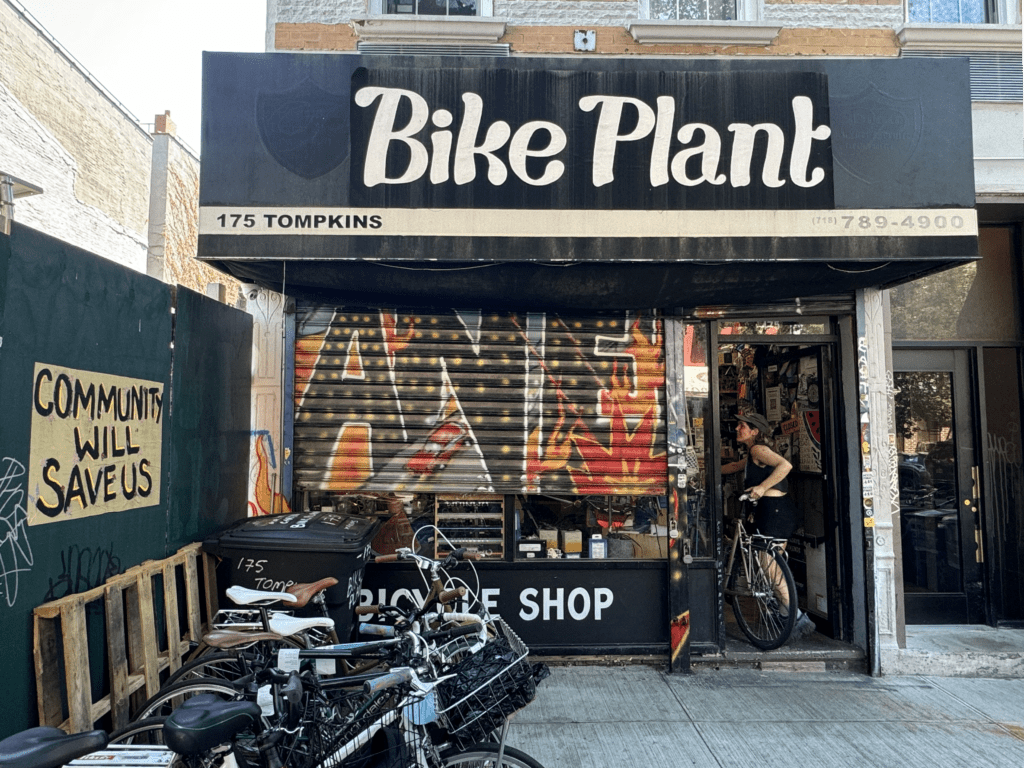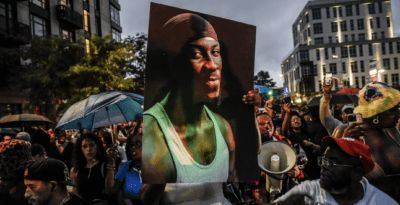In addition to repairs, Bike Plant also offers classes to help fix and maintain your own bike (Photo by Lamar Salter)
Bike Plant is making the streets safer with affordable repair for those in need
With its repair fund, the Bed-Stuy bike shop has planted seeds to help the cyclist community grow stronger and more diverse
When you walk into Bike Plant, a tiny local repair shop on Tompkins Avenue in Bed-Stuy, everything is exactly what you’d probably expect to see. There are spare parts and bike frames. There are tools and tires — like, a lot of tools and tires.
But what sets Bike Plant apart from other, larger bike shops in the city is the feeling you get after hanging around for a bit. As the workers shuffle in to start the day, they greet each other with hugs and jokes. Music playing out of a small speaker prompts an informal dance party as the front door is opened and local cyclists line up for help. A sign out front reads: “COMMUNITY WILL SAVE US.” There is a strong sense of warmth and camaraderie.
As I ask Robin Graven-Milne, the owner of Bike Plant, where this comes from, I get cut off: “I’m Canadian,” they say with a laugh.

Photo by Lamar Salter
‘I’m actually doing something’
Born in Vancouver, Graven-Milne always enjoyed cycling, but it wasn’t until moving to Brooklyn in 2013 for school, that bike repair became their life.
When a roommate who was working at Haven Cycles in Bushwick needed help, Graven-Milne took the opportunity.
“I had no other option in my job at that time because I have a liberal arts degree,” Graven-Milne says. ”I was not a mechanic. I had no idea what I was getting into at all.”
But Graven-Milne learned the ropes, not just with bike repair but also with managing the business, eventually becoming a co-owner of the shop.
But after three years, the relationship soured and Graven-Milne left. After working odd jobs to stay afloat, Graven-Milne realized that bike repair was something that could help strengthen the community they now called home.
“it’s very satisfying to figure things out and fix something and then see someone riding the bike around,” Graven-Milne says. “Like that person is there because I was able to fix their bike. it feels like I’m actually doing something.”
So Graven-Milne took a risk, opening a new business during the pandemic, naming it Bike Plant for a few different reasons.


Robin Graven-Milne (Photo by Lamar Salter)
“It’s something that’s growing and expanding,” Graven-Milne says. ”But it’s also like a spy, like someone who’s a plant in society trying to spread their ideas.”
Three years on, Bike Plant has grown into a sustainable presence in the local cycling community with the help of a small but mighty and diverse team of bike lovers and repair experts.
“I am not necessarily a natural-born leader,” Graven-Milne admits. ”So I really rely on everyone to help improve the shop.”
With their work, which also includes bicycle training classes, the team at Bike Plant has spread the philosophy of safe cycling through cost-effective bike repair and maintenance. The biggest example of this idea is represented through the shop’s repair fund, a special service that helps subsidize costs for parts and repairs for those in need.
The fund is operated by one-time donations or via a monthly membership plan that starts at $10 and includes perks like repair discounts. Donations to the fund go to a separate credit account that can be tracked via a donation spreadsheet. Based on an honor system, anyone can access the fund if they are struggling to pay for repairs.
Graven-Milne was inspired to start the fund after visiting Wheel Simple, a local bike shop in Richmond, Virginia.
“I was like, this is smart. I think it could work in Brooklyn,” Graven-Milne says. “I wasn’t really sure, but we kind of just started it off to see what would happen. And it has been working well so far.”
With over $25,000 in donations received since its creation, the fund has covered the cost of everything from flat fixes to new wheels to even a full bike donation.
‘The bike has really helped’
One person who greatly benefitted from the fund is Abdoulaye Diallo, an immigrant from Guinea who has lived in Brooklyn for about seven months. Through a translator, Diallo, who speaks French, explains that he came to the U.S. after leaving Guinea for political and security reasons.


Abdoulaye Diallo (Photo courtesy of Bike Plant)
”In Guinea, my father was a member of the UFDG (Union of Democratic Forces of Guinea), and so I was as well. We wanted change for our country, but we had to leave because we were not safe,” Diallo says. “My situation has been unstable but I am adapting.”
Diallo had been trying to learn English while living in Brooklyn but struggled to attend classes on time because of issues with the bus or subway system. Then he was informed about the repair fund and added his name to the shop’s list. Eventually, Bike Plant was able to provide Diallo with a bike of his own to travel around the city.
“The bike has really helped me to get to school on time.” Diallo says. “In the long run, I would love to be able to pay and to give money back to the fund.”
Like the spinning wheels on the bikes they fix, the repair fund is designed to be cyclical in nature: those who received help can hopefully someday give back, and those who are provided with effective repair, make the streets safer for all riders as a result.
“I don’t want to be riding with someone behind me whose brakes don’t work,” Graven-Milne says. “Because if I slam on the brakes and their brakes don’t work, it’s gonna be bad for both us.”
You might also like 


























